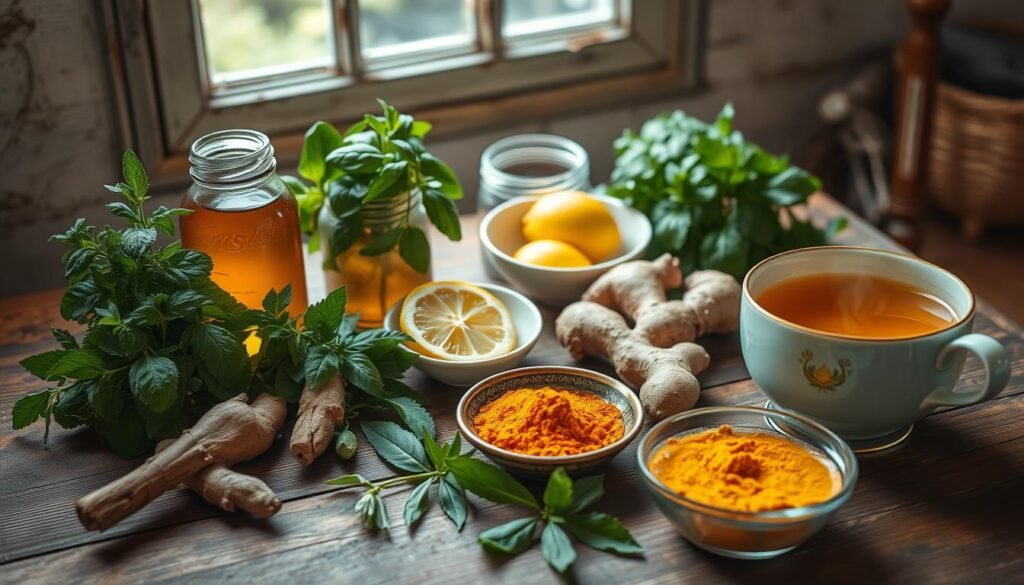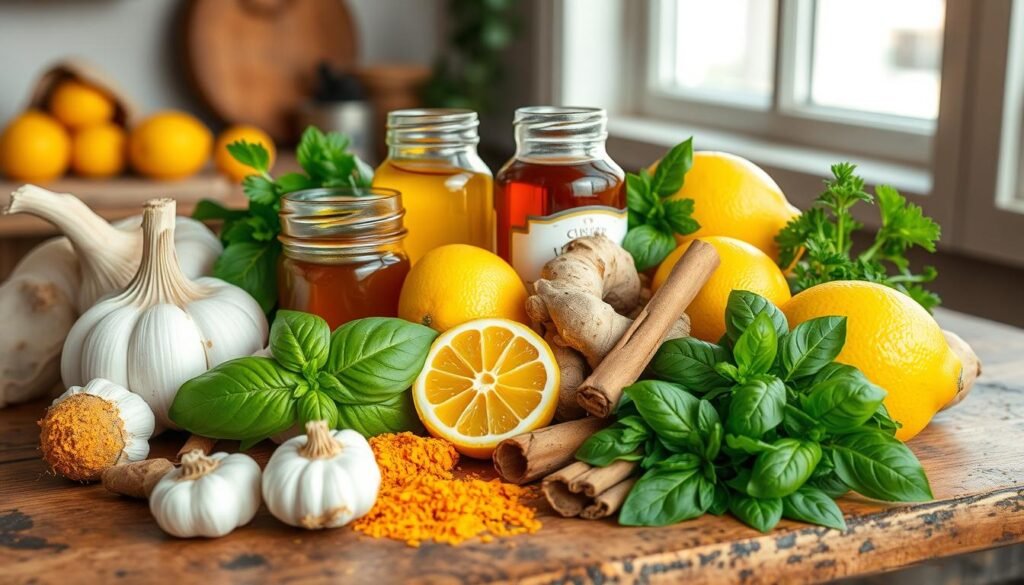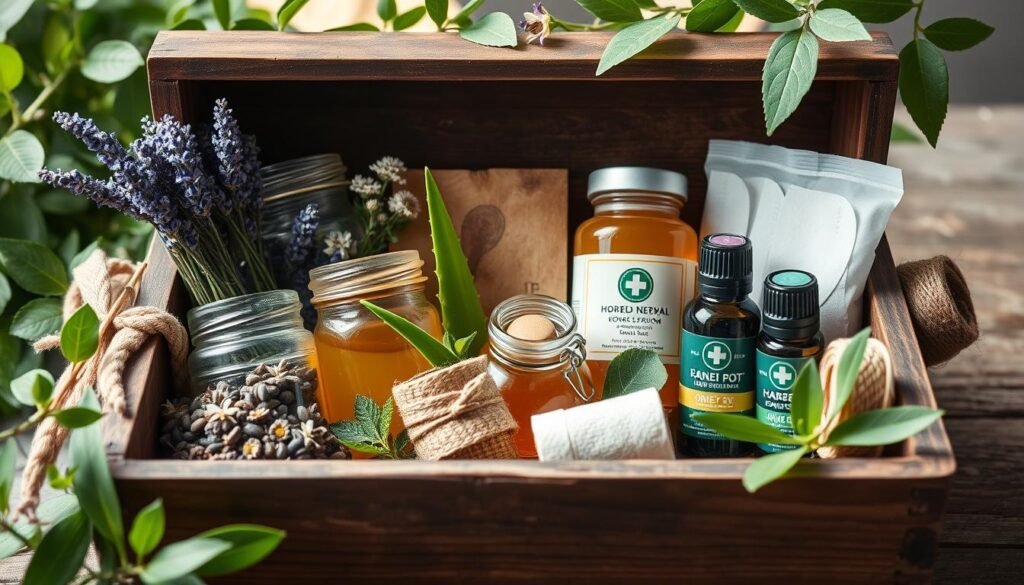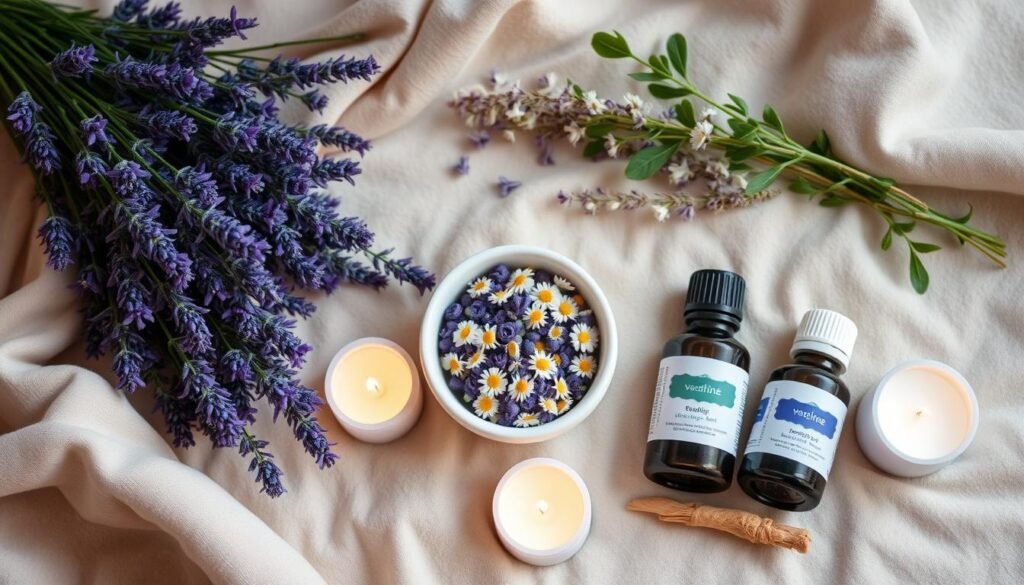Did you know nearly half of the U.S. population lacks magnesium? This can cause muscle pain, fatigue, and emotional stress. It shows how vital natural remedies are for our health. From ancient Ayurvedic practices to today’s science, these remedies are proven effective.
In this guide, we’ll look at key home remedies everyone should know. Whether you’re dealing with common health issues or looking for alternative treatments, this article has you covered. It offers knowledge and tools to help you heal naturally using household solutions.

Key Takeaways
- Home remedies have been used for thousands of years to treat various ailments.
- Many home remedies are backed by scientific research and can be effective alternatives to conventional medicine.
- Incorporating natural, household solutions can provide relief for a wide range of common health issues.
- Understanding the history and science behind traditional home remedies can empower us to make informed healthcare decisions.
- Exploring the benefits of natural treatment options can lead to a healthier, more holistic approach to our well-being.
Understanding the Power of Traditional Home Remedies
For centuries, traditional medicine and alternative therapies have been key in healthcare worldwide. They offer affordable and accessible solutions. From ancient Chinese medicine to homemade remedies passed down through generations, these natural remedies are a cornerstone of wellness in many cultures.
History of Natural Healing Methods
Traditional medicine is used in over 170 countries. Acupuncture is the most common in 113 of them. In many industrialized nations, nearly half the population uses traditional and complementary medicine. Rates are as high as 70% in Canada and 80% in some African countries.
Science Behind Home Remedies
As science has advanced, researchers have validated some traditional remedies. The World Health Organization’s (WHO) Traditional Medicine Strategy 2014–2023 aims to support safe and effective use. Modern techniques, like AI screening, are also exploring the potency and safety of these treatments.
Benefits of Natural Treatment Options
Traditional and complementary medicine offer many benefits. They have fewer side effects, are cost-effective, and improve mental and emotional well-being. These options can also complement conventional medical therapies, providing a holistic approach to healthcare. However, it’s crucial to test these remedies rigorously to ensure quality, efficacy, and patient safety.
“The use of traditional medicine is not just a matter of tradition, but also a matter of necessity, especially in developing countries, where many people have limited access to conventional medicine.”
The interest in traditional and natural healing methods is growing. It’s clear these practices have a valuable role in modern healthcare. By understanding their history, science, and benefits, we can use their power to support our well-being.
Home Remedies Everyone Should Have in Their Kitchen
Our kitchens are full of natural remedies just waiting to be found. Ingredients like honey, ginger, turmeric, and garlic have been used for ages to fix many health issues. By keeping these items in our kitchens, we can use them to prevent sickness and make our own medicine.
Garlic is great for easing stomach and gastric problems when eaten first thing in the morning. Watermelon juice is also a good fix for headaches from the heat. Drinking three cups of milk with boiled dates a day can cure dry coughs.
Mixing honey with ginger juice is a classic way to fight colds, coughs, and sore throats. Putting grated cucumber on your face, eyes, and neck for fifteen minutes can help with acne and blackheads. A gargle made from turmeric and salt is the top natural cure for sore throats.
These kitchen items are strong home remedies we can easily find. By using their healing powers, we can take care of our health naturally and effectively.
“Utilizing kitchen staples for health is a brilliant way to create a home pharmacy and take preventative care into our own hands.”
Essential Herbs and Spices for Natural Healing
In the world of herbal remedies, some kitchen staples are key. Turmeric, ginger, and cinnamon are known for their health benefits. They’ve been used in traditional medicine for many health issues. Let’s look at how these natural wonders can help us stay healthy.
Turmeric and Its Anti-inflammatory Properties
Turmeric, a bright yellow spice, is famous for its curcumin. This antioxidant is as good as some anti-inflammatory drugs. Adding turmeric to your homemade solutions can help with arthritis, muscle pain, and even some cancers.
Ginger for Digestive Health and Pain Relief
Ginger is a powerful herbal remedy with a long history. Its compounds, like gingerol, help with nausea and pain. It’s great for managing discomfort and improving digestive health.
Cinnamon and Its Medicinal Uses
Cinnamon is a favorite spice for many kitchen cures. It can lower blood sugar in diabetics by 10-29%. It also helps with blood lipid and blood pressure levels, supporting heart health.
These are just a few examples of herbal remedies in your kitchen. Using these kitchen cures daily can boost your health. It’s a way to explore homemade solutions for holistic healing.
Powerful Kitchen Ingredients as Medicine
In today’s world, we often forget the healing power of kitchen staples. Ingredients like apple cider vinegar and baking soda can turn into natural remedies. They can even match the power of modern medicines. By using our grandmothers’ wisdom and traditional medicine, we can make a DIY medicine cabinet in our kitchens.
Turmeric, also known as curcumin, is a key ingredient. It has been shown to fight inflammation, protect against damage, and kill bacteria and viruses. Its main strength comes from its ability to reduce inflammation and protect against damage.
Ginger is another kitchen favorite for fighting nausea and digestive problems. It has compounds that fight inflammation and is full of antioxidants. This makes it great for many stomach issues and helps with nausea.
| Kitchen Ingredient | Medicinal Properties | Health Benefits |
|---|---|---|
| Turmeric (Curcumin) | Anti-inflammatory, antioxidant, antibacterial, antiviral, antiparasitic | Reduces inflammation, supports immune system, promotes overall health |
| Ginger | Anti-inflammatory, antioxidant | Alleviates nausea, improves digestion, reduces pain and inflammation |
| Cumin | Antioxidant, antidiabetic | Supports weight management, cholesterol control, stress reduction |
| Peppermint | Antimicrobial, bronchodilator, muscle relaxant | Promotes cardiovascular and pulmonary health, provides cooling effects |
| Echinacea | Immune system support | May help prevent and shorten the duration of colds |
These are just a few examples of kitchen ingredients with medicinal powers. Using these natural remedies can help us control our health without expensive medicines. By following our ancestors’ wisdom and using what we have in our kitchens, we can find a more affordable and natural way to stay healthy.

Natural Pain Relief Solutions
When we feel pain, we often turn to over-the-counter meds. But, there are natural ways to ease pain without the side effects of drugs. Hot and cold therapy, and herbal remedies, are great options for frugal healthcare.
Hot and Cold Therapy Applications
Hot and cold therapy are simple and effective for pain relief. Heat increases blood flow and relaxes muscles. Cold therapy numbs pain and reduces swelling. Switching between hot and cold can help more.
Herbal Pain Management Options
Herbs from nature can help with pain. Willow bark has salicin, like aspirin. Capsaicin in chili peppers eases nerve pain. Turmeric, ginger, and cloves also fight inflammation.
Natural Anti-inflammatory Remedies
Some foods and supplements are natural anti-inflammatories. Fatty fish like salmon have omega-3s that reduce inflammation. Leafy greens like spinach have antioxidants. Turmeric, ginger, and boswellia are also good for inflammation.
Using these natural remedies can help manage pain and improve health. They are safe and effective alternatives to traditional pain meds.
| Natural Pain Relief Method | Benefits | Supporting Research |
|---|---|---|
| Boswellia | Effective and safe treatment for osteoarthritis, helping to ease pain and stiffness | A 2020 study involving 545 people found Boswellia to be an effective and safe treatment for osteoarthritis. |
| Turmeric (Curcumin) | Reduces inflammation and pain, particularly beneficial in bone-related conditions like arthritis | Turmeric, containing curcumin, has been extensively studied for its ability to reduce inflammation and pain. |
| Cloves (Eugenol) | Natural pain reliever, commonly used in OTC pain rubs and capsules for pain relief | Research suggests that cloves, containing eugenol, a natural pain reliever, are commonly used in OTC pain rubs and capsules for pain relief. |
| Acupuncture | Releases serotonin, a brain chemical that eases pain, and reduces stress levels while promoting healing | Acupuncture has been shown to release serotonin, a brain chemical that eases pain, as well as reduce stress levels and promote healing. |
“Herbal extracts like lavender, rosemary, peppermint, ginger, and feverfew are believed to have pain-relieving properties due to their phenolic compounds which are strong antioxidants and anti-inflammatory agents.”
Exploring natural pain relief can lead to safe and effective alternatives to traditional meds. It also supports our health and well-being.
Essential Oils and Their Therapeutic Benefits
Essential oils are a key part of alternative healing. They come from plants and offer many health benefits. From calming lavender to refreshing peppermint, they can change how we care for ourselves.
Lavender oil helps us relax and sleep better. Eucalyptus oil is great for breathing problems. These oils show that natural remedies can be just as good as medicine.
Essential oils fight infections and reduce pain. Tea tree oil fights fungus, and frankincense oil reduces swelling. They are powerful tools for health.
But, we must use essential oils carefully. They can be strong, so we need to follow the right steps. Always dilute them and do patch tests to avoid skin problems.
Using essential oils wisely is important. We should talk to doctors or experts before using them. This way, we can use their healing powers safely and naturally.
| Essential Oil | Therapeutic Properties | Potential Applications |
|---|---|---|
| Lavender | Calming, stress-relieving, sleep-promoting | Anxiety reduction, insomnia relief, pain management |
| Peppermint | Invigorating, anti-inflammatory, digestive support | Headache relief, nausea reduction, muscle pain management |
| Tea Tree | Antimicrobial, antifungal | Acne treatment, athlete’s foot, ringworm |
| Frankincense | Anti-inflammatory, mood-enhancing | Arthritis relief, stress and anxiety reduction, sleep improvement |
| Eucalyptus | Decongestant, pain-relieving | Respiratory support, muscle pain management, herpes simplex treatment |
Essential oils open up a world of health benefits. They can change how we think about health care. By using them wisely, we can find a natural way to feel better.
Natural Remedies for Common Digestive Issues
Dealing with digestive problems is common, but we don’t need harsh meds. Homemade treatments and green living can offer gentle, frugal healing. Let’s look at some natural remedies that can soothe our stomachs and improve gut health.
Solutions for Indigestion and Bloating
Peppermint tea is a trusted remedy for bloating and gas. The menthol in peppermint has anti-inflammatory properties that ease digestive discomfort. Ginger is also powerful, reducing flatulence, bloating, and cramps. Adding a teaspoon of apple cider vinegar to ginger tea can give an extra boost.
Natural Treatments for Nausea
Ginger is a natural wonder for nausea. It helps reduce vomiting and queasy feelings. Drinking ginger tea or sucking on ginger candies can offer quick relief.
Herbal Teas for Gut Health
- Chamomile tea is known for its soothing effects, calming an upset stomach and promoting better digestion.
- Fennel tea is another great choice, as fennel seeds ease bloating, gas, and heartburn.
- Drinking kombucha or eating yogurt with live cultures can nourish gut bacteria.
While these natural remedies are very helpful, always talk to a healthcare provider if problems persist or get worse. Eating a balanced, fiber-rich diet and managing stress can also support our digestive health.
Building Your Natural First Aid Kit
Being health-conscious means knowing the value of natural remedies. It’s key to be ready for any situation. A natural first aid kit is a smart move for our families’ health. These home treatments, household remedies, and DIY treatments are great for minor issues. They’re safer and better for the planet than regular medicines.
Our kit should have items for many needs. Aloe vera gel helps with burns, activated charcoal for poison, and witch hazel for skin problems. These natural options help heal without the bad side effects of synthetic drugs.
- Aloe vera gel: Cooling, anti-inflammatory, and soothing for minor burns and sunburns.
- Activated charcoal: Effective for absorbing toxins and poisons in emergency situations.
- Witch hazel: Astringent properties make it useful for treating skin irritations, minor cuts, and insect bites.
- Essential oils (e.g., lavender, tea tree, peppermint): Provide a range of therapeutic benefits for various ailments.
- Herbal teas (e.g., chamomile, ginger, turmeric): Offer natural relief for digestive issues, pain, and inflammation.
- Homemade salves and ointments: Containing ingredients like coconut oil, beeswax, and herbs for skin care and wound healing.
With a full natural first aid kit, we can handle many health issues. From cuts and scrapes to stomach problems and breathing issues. This way, we can take care of ourselves and our families. We’re ready for life’s surprises with home treatments, household remedies, and DIY treatments.

“Having a well-stocked natural first aid kit gives me a sense of security, especially during times of uncertainty. I feel empowered to provide my family with safe and effective solutions for minor health concerns.”
Immune System Boosters from Nature
In today’s fast world, we often forget about basic health care. But, using natural immune boosters can help keep us healthy. We’re excited to share some of nature’s best ways to boost our immune system, focusing on affordable wellness and folk medicine essentials.
One top immune-boosting food is citrus fruits, full of vitamin C. Drinking eight, 8-ounce glasses of water a day helps keep us hydrated and boosts our immune system. Also, getting seven to eight hours of sleep each night is key for our body’s defense.
Eating a variety of colorful fruits and veggies is another great way to boost the immune system. For example, red bell peppers have more vitamin C than oranges. Almonds, with their vitamin E, also help keep us healthy.
- Probiotics in foods like yogurt and miso help our gut and immune system.
- Practicing self-care, like meditation and exercise, can also boost our immune system.
- Herbs like turmeric and ginger are natural immune system boosters we can use every day.
By using these affordable wellness and folk medicine essentials, we can actively support our immune system. This helps us stay healthy and feel our best.
| Nutrient | Recommended Daily Intake | Top Food Sources |
|---|---|---|
| Vitamin C | 75-90 mg | Red bell peppers, citrus fruits, broccoli |
| Vitamin E | 15 mg | Almonds, sunflower seeds, avocado |
| Zinc | 8-11 mg | Pumpkin seeds, oysters, beef |
By using nature’s preventative care remedies, we can make our immune system stronger. This way, we can keep our health in top shape while enjoying the benefits of folk medicine essentials that have been around for centuries.
Traditional Remedies for Sleep and Stress
In today’s fast world, getting good sleep and managing stress are key for our health. Luckily, grandma’s old ways and nature’s healing can help. They offer many homemade fixes for our sleep and stress problems.
Natural Sleep Aids
Struggling with sleep? Try chamomile tea, valerian root, or lavender. They work well. Melatonin supplements can also help, especially for seniors. Adding these natural sleep helpers to your day can lead to better sleep and feeling refreshed.
Stress-Relief Solutions
Stress affects our body and mind. Adaptogenic herbs like ashwagandha help our body handle stress. Exercise, meditation, and deep breathing are also great ways to reduce stress. They’re easy to add to our daily routine.
Calming Herbal Preparations
Herbal teas and tinctures can calm us down and help us sleep better. A warm cup of lemon balm or passionflower tea before bed can relax your mind and body. Using these natural remedies can help us sleep and manage stress better.

“Grandma’s wisdom and the holistic healing power of nature offer a plethora of homemade solutions to modern sleep and stress challenges.”
Safety Guidelines and Precautions
When using home remedies and building your DIY medicine cabinet, safety is key. Natural treatments can be helpful, but knowing how to use them safely is important. Always talk to a healthcare professional before trying new preventative care methods, especially if you’re pregnant, nursing, or on medication.
Be careful of allergic reactions. Some natural ingredients, like certain herbs or essential oils, can cause problems for people with allergies. It’s a good idea to do a patch test or start with a small dose to check if you’re okay.
Also, think about how natural remedies might affect other medicines you’re taking. Some herbs and supplements can change how well or safely other treatments work. Always talk about your home pharmacy with your healthcare provider.
When using essential oils or applying natural treatments to your skin, follow the instructions carefully. Using them wrong or too much can cause skin problems. Also, keep all DIY medicine cabinet items safe and out of children’s and pets’ reach to avoid accidents.
Remember, natural remedies are great for your preventative care routine, but they shouldn’t replace doctor’s advice or treatment. Always check with a healthcare professional before starting a new natural health plan.
By following these safety tips, you can safely use natural remedies and take care of your health. Use your home pharmacy wisely and with caution.
Conclusion
Home remedies are a natural and often cheaper way to handle common health problems. By adding these remedies to our home care, we can help our families stay healthy. We can use traditional herbs, spices, and essential oils for many natural treatments.
We’ve looked at the science and history of home remedies and their benefits. They can help with pain, digestion, and boosting our immune system. With a natural first aid kit and safety knowledge, we can use these remedies every day.
Home remedies are key in today’s changing healthcare world. They let us take charge of our health and connect with natural healing traditions. Let’s use these essential remedies to improve our lives and the lives of those we care about.
FAQ
What are the benefits of using home remedies?
Home remedies are often safer and cheaper than doctor’s visits. They are easy to find and use. Many have been proven to work well by science.
What are some common kitchen ingredients that have medicinal properties?
Honey, ginger, turmeric, and garlic are great for health. They can help with many health issues.
How can herbs and spices be used for natural healing?
Herbs like turmeric and ginger are full of health benefits. Turmeric fights inflammation, and ginger helps with nausea and pain.
What are some everyday kitchen items that can be used for health purposes?
Apple cider vinegar, lemon, and baking soda are great for health. They are cheap and can be part of a natural health kit.
How can essential oils be used for therapeutic benefits?
Oils like lavender and peppermint can relax and relieve pain. But, use them carefully and know the risks.
How can natural remedies support the immune system?
Foods like citrus fruits and pumpkin seeds boost immunity. Echinacea supplements also help. Eating these regularly can keep you healthy.
What safety precautions should be taken when using home remedies?
Always check with a doctor before trying new remedies. This is especially true if you’re pregnant or taking medicine. Watch out for allergies and interactions.
